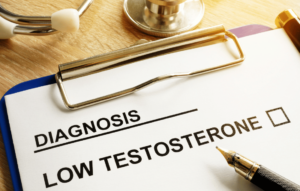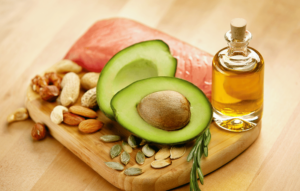When it comes to men’s health, testosterone is often a central focus. This vital hormone influences everything from muscle mass and energy levels to mood and, of course, libido.
While many factors can impact our testosterone levels, recent research has uncovered a surprising and significant connection: your diet. Specifically, the types of fats you consume can play a crucial role in maintaining or disrupting your testosterone balance.
In this article, we’re going to take a look at a recent scientific study to explore how different dietary fats — specifically saturated and polyunsaturated — can affect testosterone levels. We hope to offer you some insights and practical tips to help you dial in your approach to diet and in turn your overall health.
The Role of Testosterone in Men’s Health
Testosterone is a crucial hormone that significantly impacts various aspects of men’s health. It’s often referred to as the “male hormone,” because it plays a pivotal role in maintaining physical, mental, and sexual well-being for men. Here’s why testosterone is essential and how its levels can influence different areas of life:
Physical Health
Testosterone is vital for developing and maintaining muscle mass and strength. It aids in fat distribution, promoting a lean body composition. Additionally, it contributes to bone density, reducing the risk of osteoporosis as men age. Adequate testosterone levels are also linked to energy levels and overall physical performance, making it essential for maintaining an active lifestyle.

Mental Health
The influence of testosterone extends beyond the physical realm, impacting mental health as well. Adequate testosterone levels are associated with better mood regulation, cognitive function, and overall mental clarity. Low testosterone levels can lead to symptoms such as fatigue, depression, irritability, and difficulty concentrating, affecting a man’s quality of life.
Sexual Health
Testosterone plays a fundamental role in sexual health and reproductive function. It drives libido, or sexual desire, and is necessary for normal erectile function. Low testosterone levels can lead to a decreased sex drive, erectile dysfunction, and other sexual health issues, seriously affecting intimate relationships and self-esteem.
Low Testosterone Trends
In recent decades, there has been a concerning decline in serum testosterone levels among men, the causes of which remain unclear. Low testosterone is associated with several health problems, including obesity, metabolic syndrome, and type 2 diabetes. It can also contribute to cardiovascular issues and diminished physical and mental vitality. Age, body mass index (BMI), alcohol intake, physical activity, and smoking status are known factors that impact testosterone levels.
several health problems, including obesity, metabolic syndrome, and type 2 diabetes. It can also contribute to cardiovascular issues and diminished physical and mental vitality. Age, body mass index (BMI), alcohol intake, physical activity, and smoking status are known factors that impact testosterone levels.
While age and genetics play a role in determining testosterone levels, lifestyle factors are equally important. Regular exercise, a balanced diet, sufficient sleep, and stress management are crucial for maintaining optimal testosterone levels. Conversely, a sedentary lifestyle, poor dietary habits, chronic stress, and lack of sleep can negatively impact testosterone production.
Key Findings from Recent Research
In a recent study published in the European Journal of Clinical Nutrition, researchers investigated the relationship between dietary fatty acid consumption and serological steroid hormone-binding globulin (SHBG) and testosterone levels in middle-aged male residents of Eastern Finland. This study sheds light on how different types of dietary fats may influence testosterone levels, offering valuable insights for men aiming to optimize their hormonal health through diet.
different types of dietary fats may influence testosterone levels, offering valuable insights for men aiming to optimize their hormonal health through diet.
Study Overview
The cross-sectional study included 2,546 middle-aged males with an average age of 53 years. These participants were part of the Kuopio Ischaemic Heart Disease Risk Factor Study (KIHD). Data were collected from baseline KIHD examinations conducted between 1984 and 1989. The study excluded individuals with missing serological androgen levels, inadequate dietary intake data, cancer patients, and those undergoing hormonal therapy. Blood samples, dietary intake records, and lifestyle questionnaires were used to gather comprehensive data on the participants.
The Key Findings
The research focused on understanding how individual dietary fatty acids — saturated fatty acids (SFA), monounsaturated fatty acids (MUFA), polyunsaturated fatty acids (PUFA), and trans fatty acids (TFA) — affect androgen levels, including SHBG and free and total testosterone.
- Saturated Fatty Acids (SFA): Increased SFA consumption was initially associated with higher levels of SHBG and testosterone. However, after adjusting for other potentially confounding factors such as age, calorie intake, and lifestyle variables, these associations became non-significant. This indicates that while there may be a link between SFA intake and testosterone levels, it is not strong enough to be considered independent of other factors.
- Polyunsaturated Fatty Acids (PUFA): Higher PUFA intake was related to lower levels of SHBG and testosterone. Similar to SFA, these associations weakened after adjusting for confounders. This suggests that PUFAs might have a potential impact on lowering testosterone, but more research is needed to confirm this effect independently.
- Monounsaturated Fatty Acids (MUFA) and Trans Fatty Acids (TFA): The study found no significant relationship between MUFA or TFA intake and androgen levels. This indicates that these types of fats may not have a substantial impact on testosterone levels.
- Isocaloric Nutrient Replacement: An interesting finding emerged when researchers analyzed the effects of replacing dietary proteins with saturated fats. This substitution was linked to increased levels of SHBG and total testosterone. Specifically, replacing protein calories with SFA calories was associated with a 1.0 nmol/L increase in SHBG levels and a 0.3 nmol/L increase in total testosterone. This suggests that dietary composition adjustments, particularly involving protein and saturated fat, could influence testosterone levels.
Implications and Future Directions
While the study’s findings offer intriguing insights, they also highlight the complexity of the diet-testosterone relationship. The observed associations were not strong enough to establish a direct causal link, indicating the need for further research. Future studies, such as randomized controlled trials, are necessary to determine the precise impact of dietary fats on testosterone levels and to explore the potential for dietary interventions to improve male reproductive health.

The study underscores the importance of considering overall dietary patterns and lifestyle factors when addressing testosterone levels. Men looking to optimize their hormonal health should focus on a balanced diet rich in diverse nutrients, regular physical activity, and other healthy lifestyle practices. By doing so, they can support their testosterone levels and overall well-being in a holistic manner.
Tips for Supporting Healthy Testosterone Levels
Maintaining optimal testosterone levels is obviously crucial for overall health and well-being in men. While dietary factors play a role, it’s essential to consider a holistic approach that incorporates lifestyle choices. Here are practical tips based on current research and expert recommendations to support healthy testosterone levels:
Balanced Diet Composition
- Focus on Healthy Fats: Incorporate sources of healthy fats such as avocados, nuts, seeds, and fatty fish like salmon. These foods provide essential fatty acids like omega-3s, which support hormone production.

- Moderate Saturated Fats: While excessive saturated fat intake may not be beneficial, moderate amounts from sources like lean meats, dairy, and coconut oil can be part of a balanced diet.
- Limit Trans Fats: Minimize intake of trans fats found in processed foods, fried foods, and commercially baked goods, as they adversely affect overall health.
- Varied Protein Sources: Include lean proteins such as poultry, fish, beans, and legumes.
Nutrient-Rich Choices
- Colorful Fruits and Vegetables: Aim for a variety of colorful fruits and vegetables to obtain antioxidants, vitamins, and minerals that support overall health and possibly influence hormonal balance.
- Whole Grains: Opt for whole grains like oats, quinoa, and brown rice, which provide fiber and essential nutrients that contribute to overall well-being.
Physical Activity and Exercise
- Resistance Training: Engage in regular resistance training exercises, such as
 weightlifting or bodyweight exercises. Resistance training can help build muscle mass and improve insulin sensitivity, which may positively influence testosterone levels by improving overall health.
weightlifting or bodyweight exercises. Resistance training can help build muscle mass and improve insulin sensitivity, which may positively influence testosterone levels by improving overall health. - Cardiovascular Exercise: Incorporate aerobic activities like jogging, swimming, or cycling to promote cardiovascular health and overall fitness.
Optimize Sleep and Manage Stress
- Quality Sleep: Aim for 7-9 hours of uninterrupted sleep per night to support hormone production and overall health.
- Stress Management: Practice stress-reducing techniques such as meditation, deep breathing exercises, or yoga to manage cortisol levels, which can impact testosterone production.
Avoid Harmful Substances
- Limit Alcohol: Excessive alcohol consumption can negatively affect hormone levels. Moderation is key to maintaining overall health.

- Avoid Smoking: Smoking has been linked to lower testosterone levels. Quitting smoking can have positive effects on hormonal balance and overall health.
Regular Health Check-Ups
- Monitor Testosterone Levels: Regularly monitor testosterone levels through blood tests, especially if you experience symptoms of low testosterone such as decreased libido, fatigue, or changes in mood.
- Consult with Healthcare Professionals: Seek guidance from healthcare providers or nutritionists to tailor dietary and lifestyle recommendations based on individual needs and health status.
By adopting these practical tips and maintaining a balanced lifestyle, men can hugely influence healthy testosterone levels and their overall well-being. Incorporating nutrient-rich foods, regular physical activity, and stress management strategies go a long way in optimizing hormonal health.
Final Thoughts
In exploring the relationship between dietary fats and testosterone levels among middle-aged men, the findings from the European Journal of Clinical Nutrition underscore several critical insights. While the study did not reveal any direct independent associations between specific dietary fats and serological androgen concentrations, it did reveal that there is a lot of nuance in these interactions. It also does a lot to open the door for further study and personal experimentation.
The observation that replacing calorie intake from proteins with saturated fatty acids potentially elevates serological androgen levels prompts a big reconsideration of dietary strategies. This suggests that dietary composition, including the quality and sources of fats consumed, may be a significant factor in hormonal balance.
Moving forward, integrating nutrient-rich foods, emphasizing omega-3 fatty acids, and including moderate amounts of saturated fats can help us strive for peak hormonal health. Coupled with regular physical activity, effective stress management, and adequate sleep, these steps form the foundation of a holistic approach to supporting testosterone levels and overall well-being.
As we navigate the complexities of hormonal health, personalized approaches and ongoing research will continue to refine and expand our understanding. Embracing these insights empowers individuals to proactively nurture hormonal balance and level up their health.
Stay informed, stay proactive, and prioritize your journey towards balanced hormones and vibrant health.
Thank you for joining us on this exploration of dietary fats and their impact on hormonal health. Good luck gentlemen.



 weightlifting or bodyweight exercises.
weightlifting or bodyweight exercises. 






